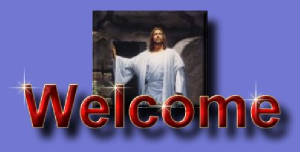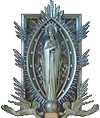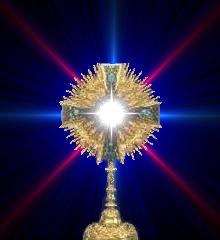|
|
 |
|


Holy Spirit, be with me today.
Be my teacher, my guide, my counselor, my friend.
Fill me with your gifts, especially
the gifts of
wisdom, discernment, knowledge, understanding, compassion,
love, and awe in God's presence.
In all that
I think, say, and do, let it be in accordance
with your most holy and perfect will.
I ask this in Jesus' name.
AMEN.
How my faith shapes the way I live my life...
The Necessity of the Resurrection of Jesus Christ:
For I handed on to you as of first importance what I in turn had received: that
Christ died for our sins in accordance with the scriptures, and that he was buried, and that he was raised on the third day
in accordance with the scriptures, and that he appeared to Cephas, then to the twelve. Then he appeared to more than five
hundred brothers at one time, most of whom are still alive, though some have fallen asleep. Then he appeared to James, then
to all the apostles. Last of all, as to one untimely born, he appeared also to me.... If Christ has not been raised, your
faith is futile and you are still in your sins. Then those also who have fallen asleep in Christ have perished. If for this
life only we have hoped in Christ, we are of all people most to be pitied. But in fact Christ has been raised from the dead,
the first fruits of those who have fallen asleep. For since death came through a man, the resurrection of the dead has also
come through a man; for as all die in Adam, so all will be made alive in Christ
(1st Letter of Paul to the Corinthians,
15:3-22).
|
 |
|
Beliefs express themselves in all aspects of a person's life. I'll use this page to describe how my own convictions have
influenced my life and how they shape my daily activities.
For instance, I might describe how my belief system has
inspired me to volunteer some time to a local Catholic Church. Or I might talk about how my relationship with my children
has benefited from my beliefs.

CROSSING THE THRESHOLD OF HOPEHoly
Father, in light of everything you have said to us, and for which we are grateful, must we conclude that it is truly unjustifiable-today
more than ever-"to be afraid" of the God of Jesus Christ? Are we to conclude that it is really worth it all "to cross the
threshold of hope," to discover that we have a Father, to rediscover that we are loved?
The psalmist says: "The fear of the Lord is the beginning of wisdom" (cf. Ps 110[111]:10). Allow me to refer to these
biblical words in responding to your question.
The Holy Scriptures contain an insistent exhortation to cultivate the fear of God. We are speaking here of that fear which
is a gift of the Holy Spirit. Among the seven gifts of the Holy Spirit, indicated in the words of Isaiah (cf. Is 11:2),
fear of God is listed last, but that does not mean it is the least significant, since it is precisely fear of God that
is the beginning of wisdom. And among the gifts of the Holy Spirit, wisdom holds first place. Therefore, we need to
pray that people everywhere and especially people in our own time will receive the fear of God.
From the Holy Scriptures we also know that this fear-the origin of wisdom-has nothing in common with the fear of a slave.
It is filial fear, not servile fear! The Hegelian paradigm of master-slave is foreign to the Gospel. It is a paradigm
drawn from a world in which God is absent. In a world in which God is truly present, in the world of divine wisdom, only filial
fear can be present.
The authentic and full expression of this fear is Christ Himself. Christ wants us to have fear of all that is an
offense against God. He wants this because He has come into the world in order to set man free for freedom. Man is set free
through love, because love is the source par excellence of all that is good. This love, according to the words of Saint
John, drives out all fear (cf. 1 Jn 4:18). Every sign of servile fear vanishes before the awesome power of the All-powerful
and all-present One. Its place is taken by filial concern, in order that God's will be done on earth-that will which is the
good that has in Him its origin and its ultimate fulfillment.
Thus the saints of every age are also an incarnation of the filial love of Christ, which is the source of a Franciscan
love for all creatures and also of love for the saving power of the Cross, which restores to the world the balance between
good and evil.
Is contemporary man truly moved by a filial fear of God, a fear that is first of all love? One might think-and there
is no lack of evidence to this effect-that Hegel's paradigm of the master and the servant is more present in people's consciousness
today than
is wisdom, whose origin lies in the filial fear of
God. The philosophy of arrogance is born of the Hegelian paradigm. The only force capable of effectively counteracting
this philosophy is found in the Gospel of Christ, in which the paradigm of master-slave is radically transformed into the
paradigm of father-son.
The father-son paradigm is ageless. It is older than human history. The "rays of fatherhood" contained in this formulation
belong to the Trinitarian Mystery of God Himself, which shines forth from Him, illuminating man and his history.
This notwithstanding, as we know from Revelation, in human history the "rays of fatherhood" meet a first resistance in
the obscure but real fact of original sin. This is truly the key for interpreting reality. Original sin is not only
the violation of a positive command of God but also, and above all, a violation of the will of God as expressed in that
command. Original sin attempts, then, to abolish fatherhood, destroying its rays which permeate the created world, placing
in doubt the truth about God who is Love and leaving man only with a sense of the master-slave relationship. As a result,
the Lord appears jealous of His power over the world and over man; and consequently, man feels goaded to do battle against
God. No differently than in any epoch of history, the enslaved man is driven to take sides against the master who kept him
enslaved.
After all I have said, I could summarize my response in the following paradox: In order to set contemporary man free
from fear of himself, of the world, of others, of earthly powers, of oppressive systems, in order to set him free from
every manifestation of a servile fear before that "prevailing force" which believers call God, it is necessary to pray
fervently that he will bear and cultivate in his heart that true fear of God, which is the beginning of wisdom.
This fear of God is the saving power of the Gospel. It is a constructive, never destructive, fear. It creates people
who allow themselves to be led by responsibility, by responsible love. It creates holy men and women-true Christians-to whom
the future of the world ultimately belongs. André Malraux was certainly right when he said that the twenty-first century would
be the century of religion or it would not be at all.
The Pope who began his papacy with the words "Be not afraid!" tries to be completely faithful to this exhortation and is
always ready to be at the service of man, nations, and humanity in the spirit of this truth of the Gospel.
The Parables of Jesus
"I
will open my mouth in parables, I will utter what has been hidden since the foundation of the world." (Matthew 13:35)
Introduction: What Is a Parable? (revised July, 2001)
PARABLES FROM NATURE
WORK AND WAGES
OPEN & CLOSED DOORS
WEDDINGS AND FEASTS
LOST AND FOUND, FATHER AND SON
|
 |
|
|
|
 |
|

Very Good Site Check It Out And Injoy.
Footprints
One night a man had a dream. He dreamed he was walking along the beach with the Lord. Across the colorful sky flashed scenes
from his life. For each scene, he noticed two sets of footprints; one belonged to him, and the other to the Lord.
When the last scene of his life flashed before him, he looked back at the footprints and noticed that many times along
the path of his life there was only one set of footprints. He also noticed that it happened at the very lowest and saddest
times in his life.
This really bothered him and he questioned the Lord about it. " Lord, you said that once I decided to believe in you, you'd
walk with me all the way. But I have noticed that during the most troublesome times in my life, there is only one set of footprints.
I don't understand why when I needed you most you would abandon me."
The Lord said unto him, "My precious, precious child, I love you and would never leave you. During your times of trial
and tribulation, when you see only one set of footprints, it was then that I carried you."
author unknown
~this goes with the text above~ (Click Here)
WHETHER or not you are Catholic, you may have questions about the Catholic faith. You may have heard challenges to the
Catholic Church’s claim to be the interpreter and safeguard of the teachings of Jesus Christ.
Such challenges
come from door-to-door missionaries who ask, "Are you saved?", from peer pressure that urges you to ignore the Church’s
teachings, from a secular culture that whispers "There is no God."
You can’t deal with these challenges unless
you understand the basics of the Catholic faith. This booklet introduces them to you.
In Catholicism you will find
answers to life’s most troubling questions: Why am I here? Who made me? What must I believe? How must I act? All these
can be answered to your satisfaction, if only you will open yourself to God’s grace, turn to the Church he established,
and follow his plan for you (John 7:17).
Click on the link Above to Go To Catholic Answers Web Site.
Great Site To Get To Know Your Catholic Faith
St. Padre Pio (Francesco Forgione) was born on May 25, 1887 in Pietrelcina, Italy. Even as a child, Francesco had already
shown signs of extraordinary gifts of grace. At the age of five, he dedicated his life to God. From his early childhood he
showed a kind of recollection of spirit and a love for the religious life. His mother described him as a quiet child who,
from his earliest years loved to go to church and to pray. Because he was able to see and communicate with, not only his guardian
angel but also with Jesus and the Virgin Mary, as a young boy, Francesco assumed everyone had the same experiences. Once a
woman who noticed his spiritual demeanor asked him, "When did you consecrate your life to God? Was it at your first holy communion?"
and he answered, "Always, daughter, always."
When he was fifteen years old, he was admitted to the novitiate of the Capuchin friars of Morcone and was admired by his
superiors and his fellow students for his exemplary behavior and his piety. One of the novices stated, "There was something
which distinguished him from the other students. Whenever I saw him, he was always humble, recollected, and silent. What struck
me most about Brother Pio was his love of prayer."
On August 10, 1910, at the age of twenty-three, Padre Pio was ordained to the priesthood. The celebration of the Holy Mass
was for Padre Pio, the center of his spirituality. His Mass could last one and a half hours or more, due to the long pauses
of contemplative silence into which he entered at various parts of the Holy Sacrifice. Everything about him spoke of how intensely
he was living the Passion of Christ. The parish priest in Pietrelcina called Padre Pio's Mass, "an incomprehensible mystery."
When asked to shorten his Mass, Padre Pio replied, "God knows that I want to say Mass just like any other priest, but I cannot
do it."
 Anticipated Eucharist Anticipated Eucharist
In her daily preparation for Calvary, Mary experienced a kind of “anticipated Eucharist”––one
might say a “spiritual communion”––of desire and of oblation, which would culminate in her union with
her Son in his passion, and then find expression after Easter by her partaking in the Eucharist which the Apostles celebrated
as the memorial of that passion.
What must Mary have felt as she heard from the mouth of Peter, John, James and the other Apostles the words spoken
at the Last Supper: “This is my body which is given for you” (Lk 22:19)? The body given up for us and made
present under sacramental signs was the same body which she had conceived in her womb! For Mary, receiving the Eucharist
must have somehow meant welcoming once more into her womb that heart which had beat in unison with hers and reliving what
she had experienced at the foot of the Cross. (Ecclesia de Eucharistia 56)
|
 |
|
|
|
|
|
|
|
 |

